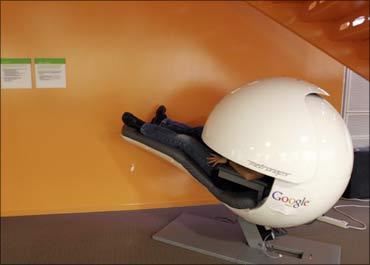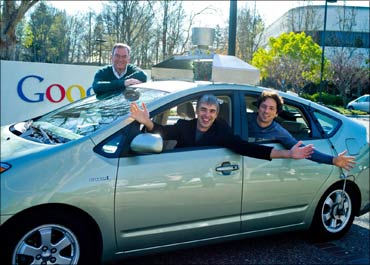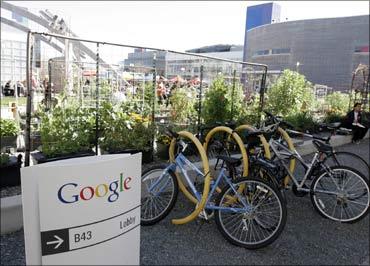Photographs: Erin Siegal/Reuters Daniel Russell
When you want to find out something about the purple bird you last saw at the Lotus Pond in Hyderabad, you are most likely to type a Google query like 'purple water bird Lotus Pond' and voila! you would discover the Purple Moorhen on your screen.
Then, if you Google 'Purple Moorhen', you will learn the bird's scientific Latin name 'Porphyrio porphyrio', the fact that it is found in India, Australia and Africa and how the state of Florida is trying to eradicate its accidentally-introduced population.
Most Google searchers, thus, with just a bit more inside information, can become super searchers. With these tips, you'll be an expert in almost no time.
Find a word on the page
Have you ever done a search and then discovered that you're on a very long web page and have no idea where your search words are?
. . .
How to add more power to Google
Image: (L to R) Eric Schmidt, Larry Page and Sergey Brin in a self-driving car.Photographs: Reuters
How to add more power to Google
Image: At the Google headquarters in Mountain View, CA employees work in their shared offices.Photographs: Erin Siegal/Reuters
How to add more power to Google
Photographs: Courtesy: Google
Use short, simple queries
A common mistake beginners make is to use too many words in their query. All those extra words actually decrease the accuracy of the search results.
Use the Advanced Search option
All Google search properties have an 'Advanced Search' feature for those who want a little more control over their searches.
Look for the blue 'Advanced Search' text to the right of the search button on Google search pages.
With Advanced Search you can search for web pages that are only in a particular language or that come from a particular site.
Use 'DEFINE'
To learn what a word really means use DEFINE. All it does is search for definitions of terms (or phrases).
. . .
How to add more power to Google
Image: Employees use community bikes to travel around Google headquarters in Mountain View, California.Photographs: Erin Siegal/Reuters
For example, you might think you know what a 'credit derivative' is, but by doing the Google query 'DEFINE: credit derivative' you can find out for sure.
DEFINE is not dictionary-based.
Google picks up words and phrases, as new ones enter the language.
A case in point, 'DEFINE: ROTL' or 'DEFINE:BRB', both are common in instant messaging and text messages, but haven't yet reached any conventional dictionaries.
Use context search terms judiciously
If you need to learn about superconductor technology quickly, use a search that includes a context term like 'tutorial.'
. . .
How to add more power to Google
Image: Surfboards lean against a wall at the Google office in Santa Monica, California.Photographs: Reuters
Other context terms that people find useful are DIY or how to (to find do-it-yourself guides), guideline (to find suggestions and guides), curriculum, lesson plans and summary are good context terms to help find particular types of content.
Use the minus sign
You can use it to eliminate unwanted results. If, for example, you're searching for the jazz standard song, recorded by Billie Holiday, Frank Sinatra, and others, that includes the lyric It was just one of those things, but the song in question is not Cole Porter's Just one of Those Things, then change the query to it was just one of those things Billie Holiday -- Porter.
You'll eliminate all the Cole Porter songs.
Daniel Russell is an expert on search quality and is based out of Google's California office









article